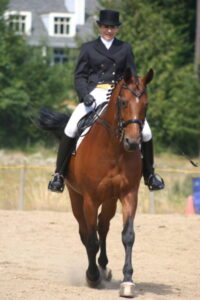Equine Guelph’s Latest Online Course is Golden!
By Jackie Zions, Equine Gelph
If you fail to plan, you can plan to fail the adage says. It is certainly true when it comes to keeping your horse comfortable in its golden years. Picking up on subtle cues and knowing when to make management changes can make all the difference in the world to your four-legged friend that has seen you through thick and thin. Invest in your horse’s retirement regime with the latest online course to be offered by TheHorsePortal.ca – The Senior Horse. First offering of this two-week virtual short course will run Sept 19 – 30, 2022.
Meet your instructor

Dr. Bobsien with semi-retired senior horse trained to Intermediare 2 giving a Dressage demo.
Photo credit: Linda Cupples courtesy Equine Gelph
There is nothing like riding a confident, experienced horse as your instructor Dr. Bettina Bobsien can attest. Course instructor, Bobsien reminds us of an important concept that applies to senior horses, “Old age is not a disease.” Aging should never be used as an excuse to allow health issues to continue when treatment options are available that can improve quality of life.
Bobsien is a Vancouver Island-based veterinarian with a lifelong passion for both animal care and animal welfare, working with both the BCSPCA and Humane Canada on a variety of animal welfare issues. She is currently the chair of the CVMA Animal Welfare Committee, chair of The Equestrian Canada Health and Welfare Committee, and the veterinary ethics editor for the Canadian Veterinary Journal.
Check out this video for a sneak peak of Dr. Bobsien’s top tips for senior horse owners.
When is a horse considered Old?
Age is just a number – yes, another truism. There is not one set age when a horse becomes “old”. You may have a spry senior campaigning well into their 20’s while others may need to scale back in their mid-teens. Therefore, the first two units of the short course are dedicated to an overview of elder horse ownership and defining a senior horse. Overall, horses are living longer, likely due to preventative care and improvements in veterinary techniques and treatments.
Knowledge obtained today can save the savvy horse owner down the road when they are able to recognize signs that early intervention is necessary. Quickly picking up on and addressing musculoskeletal abnormalities, gastrointestinal issues, dental problems, eyesight issues, heart trouble, respiratory concerns and metabolic disorders are part and parcel of being the best advocate for your horse and its welfare.
As they continue to age, horses may require special adaptations to their health care, surrounding environment and diet to maintain their well-being as they enter their golden years. Course participants will learn about teeth, body condition, thermoregulation, lameness, fitness, and nutrition. In the last century, there have been great advances in scientific knowledge on all of these topics, especially when it comes to how we feed the senior horse.
Oh baby
When horses retire from their riding or competitive careers, thoughts about breeding the next wonderful generation of offspring are often entertained. That is why one unit of the course will address common questions like: Is it too late? Are they too old? Will I need to take measures to improve fertility? How to choose a stud and more.
All good things come to an end
Of course, there is an inevitable chapter on an end-of-life plan. Recent research from Advancing Equine Scientific Excellence (AESE), approximated that only 1 in 8 horses die of natural causes. Difficult as it may be, developing a plan can ensure that when the time comes, horse owners make a timely decision and avoid prolonging suffering. Evaluating quality of life should be at the forefront of a senior horse owner’s mind and having a plan means when the time comes, an extremely tough decision will be slightly easier.
Questions and Community
Senior horse owners have shared their stories throughout the course. What are the challenges of owning a senior horse? Is a “track system” paddock right for your horse? How to keep weight on a horse whose dental challenges preclude them from eating hay and much more.
When you join TheHorsePortal.ca community as a student, you will be able to share your thoughts, ideas, and questions with participants from far and wide in the discussion forums. There is no designated time to be online within the two weeks of the course so you can engage in discussions with your instructor and a wide array of horse people when it fits into your busy schedule.
The Senior Horse online course is kindly sponsored by Boehringer Ingelheim. The two-week virtual short course will detail everything to watch for when your horse begins to age, keeping in mind each horse is an individual and they age at different rates. Become savvy for your senior horse and register today.
About Equine Gelph:
Equine Guelph is the horse owners’ and care givers’ Centre at the University of Guelph in Canada. It is a unique partnership dedicated to the health and well-being of horses, supported and overseen by equine industry groups. Equine Guelph is the epicenter for academia, industry and government – for the good of the equine industry as a whole. For further information, visit www.equineguelph.ca.











